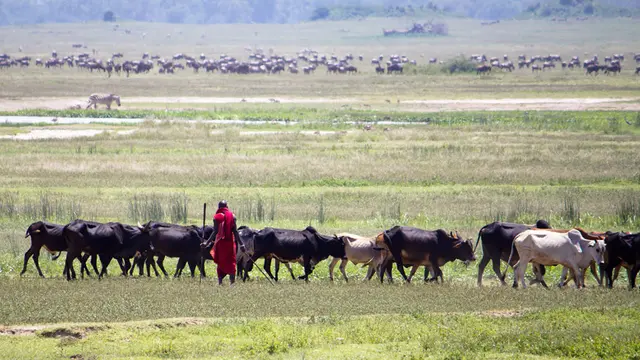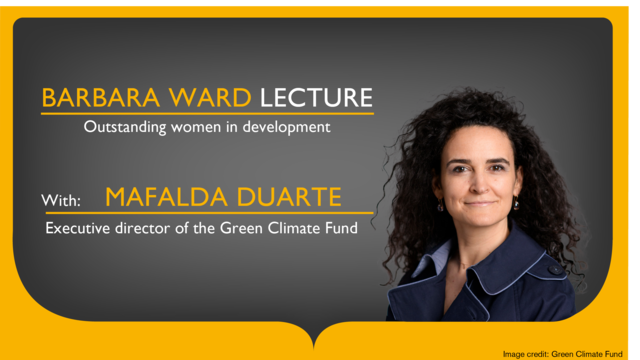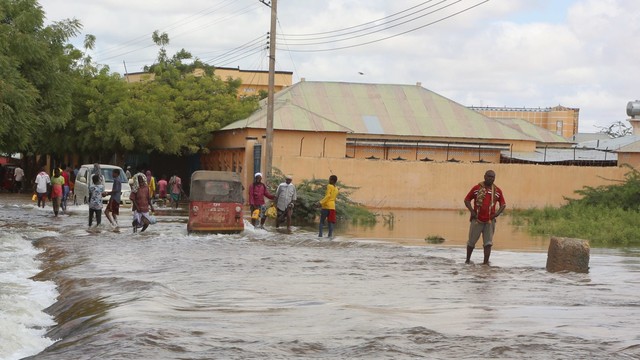Carbon credits are distorting markets and destroying local businesses
There is growing demand for carbon credits so that companies and individuals can offset their carbon emissions. This has the potential to generate huge amounts of money to help fight climate change as well as reduce poverty and inequality. But as Annet Nakyeyune writes, without proper evaluation and transparency they can also damage the businesses of people who have done the least to contribute to the climate crisis.


Woman cooking with clean energy in Musanze district, Rwanda (Photo: Rwanda Green Fund, via Flickr, CC BY-ND 2.0)
Humanity is losing the battle against climate change. Not only are climate risks increasing (PDF) but those who have done the least to contribute to global emissions are facing the biggest challenges in adapting to the new reality.
Climate action is mainly driven from the top down, and climate finance is no different. This is pushing vulnerable and marginalised groups to the periphery of climate action decision-making. Without that vital input, well intentioned financial interventions are damaging local businesses and hurting the people who rely on them, and in the process perpetuating injustices.
The delivery mechanisms of climate finance are immensely complex. Climate finance is bedevilled by a lack of transparency in how it is delivered and used. An IIED report suggests that 93% of climate finance is not transparent enough to be tracked to its end use, making it difficult to evaluate its effectiveness or measure intended and unintended consequences.
This can be seen through the case study of improved cookstoves in Uganda. Climate finance played a big role in accelerating the diffusion and acquisition of more efficient cookstoves in Uganda. But it did so at a huge cost to medium and long-term growth and the survival of local enterprises.
The cost of finance
In sub-Saharan Africa, 80% of the population cooks with solid biofuels and in Uganda, the percentage is even higher (about 90%). To improve energy use, more efficient stoves were initially subsidised by 40% in addition to promising free after-sale services. Carbon credits were earned after the project generated a pre-determined level of reduced emissions compared to traditional cookstove use.
The focus was therefore to use all means possible to distribute the stoves widely to earn the carbon credits. The more the improved stoves were used, the more energy saved, the less carbon released, and the more carbon credits were generated.
Climate finance was accessed through intermediaries linking local manufacturers of improved cookstoves with the voluntary carbon market. Local entrepreneurs partnered with project developers (mostly international NGOs) who had the financial and technical capacity to create fundable voluntary carbon finance proposals. The reduced emissions were converted into carbon credits and sold on the Voluntary Carbon Market, where individuals, companies and governments who wish to reduce their own carbon footprint purchase carbon credits to offset part of their emissions. The revenue generated by selling the carbon credits is then used to finance the cookstove projects.
Because the focus of the project was reducing carbon, not creating a viable market, it quickly ran into difficulties. The volume of stove production increased exponentially but the distribution network was not well developed. Due to the bulkiness of stoves, transportation was difficult, and the local road infrastructure is in poor condition. The low incomes of the target consumers and the presence of cheaper but inefficient alternative cooking innovations made the market unreliable.
This meant that local enterprises had to double as both producers and distributors of the stoves to increase dissemination. Because the stove use needed to be monitored for two years for the carbon credit, there needed to be regular contact between the purchaser and the distributor, which increased transaction costs.
Partnerships between the intermediaries and local enterprises were marred by a lack of transparency of vital information, yet the many non-disclosure clauses in the contracts left local enterprises with limited opportunity to seek advice from professionals in case of disagreements. For example, emission reduction invoices that showed how many carbon emission sales were made were never given to local enterprises.
Businesses up in smoke
With no government involvement to offer advisory services, local entrepreneurs were left on their own to navigate the power imbalances with their intermediary partners. Local enterprises signed contracts that they did not understand, which were detrimental to their businesses.
The proprietor of Ugastove, the pioneer stove enterprise in Uganda, was an artisan with very limited formal education. Due to limited legal and technical capacity to negotiate and implement complex contracts, the Ugastove proprietor only realised much later that he had unknowingly franchised the company’s carbon business to Impact Carbon, a climate finance company.
Even when Ugastove ceased to work with Impact Carbon in 2012, the latter maintained exclusive rights over the carbon project until 2028. Ugastove did not have the capacity to successfully seek legal redress and the proprietor had died of a heart attack in 2011.
The partnership ended with Ugastove, the pioneer of this carbon finance project, losing ownership of the project they had worked hard to build. After locking out the local enterprise from the carbon business, Impact Carbon continued to run the improved cookstove project activities under the brand of the local enterprise they took over but used different manufacturers to supply the stoves and collected climate finance as a result.
For Ugastove, lack of access to climate financing almost led to a complete business shutdown because of huge unmet financial obligations and the uphill task of relaunching the stove products afresh in the market without subsidies. The business employed many people on a casual basis including men, women and youths, and the collapse of the carbon business meant the loss of a source of livelihood for those people.
Climate finance brought many new players into the local cookstove industry, which rapidly accelerated stove production and distribution. Some distributed stoves massively reduced prices to meet the carbon credit targets through quantity. This heavily distorted the stove market because it created an artificial demand for cheap stoves. When carbon financing dwindled in 2017/18, many local enterprises struggled to reconstruct the market for unsubsidised stoves.
Despite the damage done to local businesses, it is unclear how many carbon emissions were saved as a result of the projects.
The climate finance experience for improved cookstoves in Uganda exposed unethical partnerships in the delivery of climate finance and how much damage they can cause to local people. Climate finance delivery mechanisms can be a double-edged sword if not carefully managed. They can worsen poverty and inequalities in developing countries and consequently increase vulnerability to climate impact.
With a re-awakened call for private sector commitment and action, attention needs to be put on forging ethical and transformative partnerships to deal with the triple global crises. Partnerships must seek to strengthen systems, institutions, and networks and foster mutual benefit.
This blog was originally published on LSE's website.


